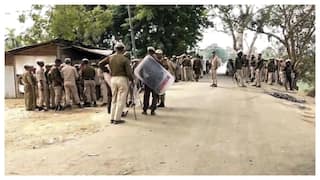Taliban Restrict Demonstrations, Sloganeering As Afghan Women Protest For Human Rights
The Taliban's latest decree is aimed at deterring women from holding protest demanding their rights from the country’s hardline Islamic rulers.

New Delhi: In a move to curb protests in Afghanistan, which witnessed demonstrations on streets especially from women after Taliban invasion, the interior ministry on Wednesday issued an order to restrict such protests in the country.
Protests will be now subjected to demonstrators getting prior permission, including approval of slogans and banners, according to news agency AP. Some of the protests witnessed heavy-handed assaults on protesters.
ALSO READ: China Backs Taliban’s Interim Govt, Announces $31 Million Aid For Afghanistan
The latest move is aimed at deterring women from holding protests demanding their rights from the country’s hardline Islamic rulers. The decree is expected to restrict any such protest as the ministry said: “It is announced to all citizens not to attempt at the present time to hold any demonstrations under any name whatsoever.”
Now, protesters will have to take permission from the ministry of justice before organising any such event including purpose, slogans, place, time, and all 'other' details, according to Pajhwok News. The details have to be shared with the authorities’ 24-hours prior to the protest.
Earlier on Wednesday, residents of Faizabad took to the streets to support the resistance in their fight against the Taliban. On September 7, a group of women organised protest in Balkh province demanding to preserve the achievements of the past 20 years and calling for women's representation in the future government in Afghanistan, as per ANI report. Similar protests were witnessed across the nation including Kabul, Parwan, and Badakhshan province.
The majority of these protests are spearheaded by Afghan women demanding rights and female representation in the caretaker government formed by the Taliban in the war-torn country.
Experts believe that the Taliban takeover will once again see a return "to some degree of what we saw in the 1990s".






































